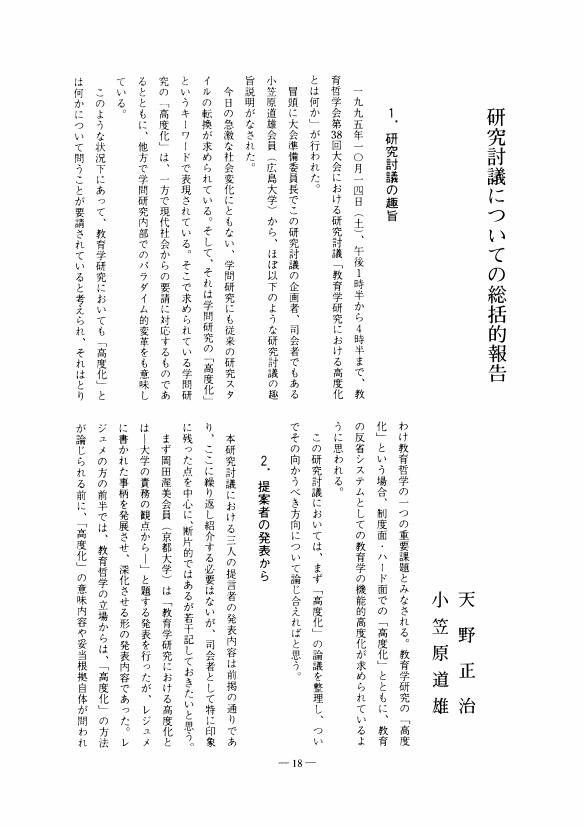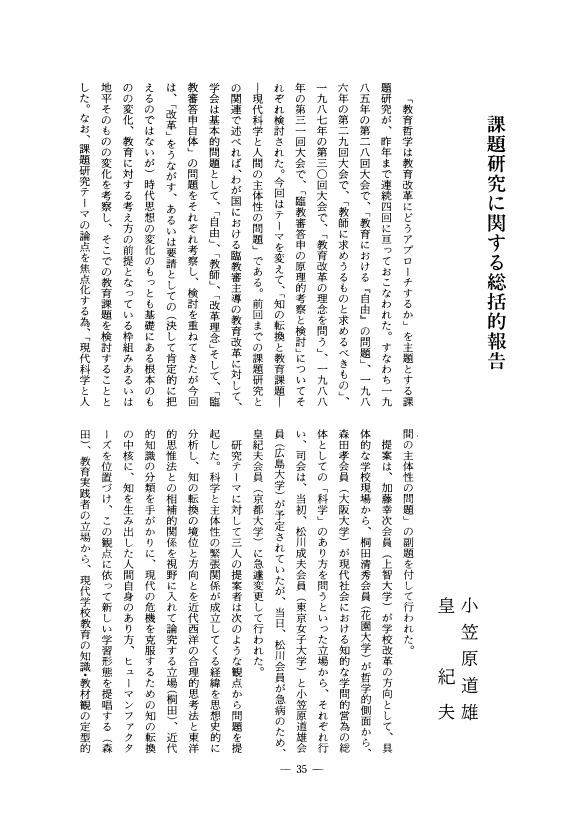2 0 0 0 映像メディア利用教育及びメディア・リテラシー形成に関する研究
- 著者
- 小笠原 道雄 那須 俊夫 アルカン M. 深田 昭三 ボールスマ J.P. 森 楙 相原 和邦 小倉 康 マンザーノ バヒリオ U 武村 重和 山口 武志 唐川 千秋 羽生 義正 鑪 幹八郎 二宮 皓 MANZANO V.u ALKAN M KARSTEN S KOPPEN J.k KOPPEN J.K. ALKAN M. KARSTEN S. BOORSMA J.P. 伊藤 克浩 草間 益良夫 細田 和雅 小笠原 道雄
- 出版者
- 広島大学
- 雑誌
- 国際学術研究
- 巻号頁・発行日
- 1993
(森楙)テレビゲームがメディア・リテラシーの無意識的な形成という潜在的な教育的役割を演じている点を明らかにすることを目的に調査研究をした。(1)学生を対象に質問紙調査を行ない、テレビゲームとコンピュータ・リテラシーとの関係を調べた。その結果、知識レベル、行動レベルいずれでも、リテラシー形状には、性別、専攻、子供時代の遊びなどの要因が大きく関わっていることが分かった。(2)テレビゲームの内容分析をした。その結果、ゲームの内容が男性中心主義で、暴力を多く含んででいることが分かった。(森楙・深田昭三・ボールマス)コンピュータのイメージやビデオゲームの過去経験がコンピュータへの態度に及ぼす影響を学生について調べた。5つの尺度からなる質問紙を作成した。これらの尺度は、コンピュータやビデオゲームの使用頻度、コンピュータに対する態度、コンピュータのイメージ、などである。質問対象は学部学生633名であった。コンピュータとしてのイメージで一番多かったのはプログラミング・モデルであり、ついでメイン・フレームまたはワードプロセッサー・モデルであった。分析の結果、コンピュータにたいする態度は、「親近感」と「難しそうだという感じ」という2つの因子を含み、パス解析の結果、コンピュータのイメージは「難しそうだという感じ」を規定し、過去におけるビデオゲームの使用は、間接的にであるが、両方の因子に影響することが分かった。(山田武志)最近の、コンピュータを使った数学の教授-学習過程に関する理論的考察を行なった。一般的考察のあとコンピュータ利用によるマニピュラティーブの特徴と役割を吟味した。このようなマニピュラティーブの特徴として相互作用機能の顕著さが明らかになった。この機能は子供にたいしコンピュータの有効な使用により「推論-証明」という問題解決活動の機械を提供し、また、数学的概念の多様な表現を準備すると思われる。現行の指導要領から、数学教育においてもコンピュータや電卓等の有効な活用が本格的に盛り込まれるようになった。もちろん数学教育においては、コンピュータの構造やプログラミング言語の理解がねらいでなく、それを一種の知的道具として活用しながら、数学的な概念や考え方の理解を図ることが意図されているといえる。従来、説明やシミュレーションといった形態で活用されがちであったコンピュータの新しい分野を開拓すべく、本研究では、コンピュータに基づく教具の特徴について、表記論的な立場から検討を加えた。その結果、多様な表現を同時に提示するというコンピュータの機能によって、表現間の翻訳が推進され、そのことがひいては数学的な意味の構成にも貢献することを指摘した。さらに、方法論的な視座から、コンピュータが「仮説-検証」型の問題解決的授業の構築に貢献することを指摘した。(カルステン、コッペン)オランダの教育界におけるニューメディアを使った色々な新しい試みを報告し、新しい試みについていけない教師の問題を指摘している。技術習得の速さは教師たちよりも児童・生徒の方が勝るので、教師たちはニューメディアにたいし恐怖さえ感じている。ここで提案として、教師のこの方面での技能開発と、一般社会におけるコンピュータの使用基盤の拡大を挙げている。(マンザ-ノ、二宮)オランダを含む数カ国のインターネットを中心とする新しい教育システムの活用の実情を、文献からのみならず直接訪問して得られた情報をもとに、比較教育学的立場から、考察を行なった。なかでも「国際教育及び情報源ネットワーク」(I*EAR)並びに「ヨーロッパ学校プロジェクト」(ESP)を検討対象とした。結論として、今や電子ハイウェイが教育刷新のイニシアティーブをとっている感を強くするとしている。(相原和邦)日本文学の研究者として、日本の文学作品(特に明治期の)にみられるヨーロッパ絵画との関係を探ることを通して、イメージを通した異文化との接触による作家(とくに夏目漱石)の内面的変化の過程を考察した。漱石が最も深い共感を示しているのはターナーで、その作風は、「草枕」、「文学論」等で言及されているほか、言語による女性描写のぼかし・幻化の手法に生かされている。本国際共同研究を機会に、今後の異文化理解に関する研究の手掛かりを得ることができた。
ポスト・モダン的状況下における教育科学の課題に関して日独協力研究を実施した結果、下記の諸点について新たな知見が得られた。美学、身体性の観点から:「ミーメーシス」は美学の特殊な術語として理解されてきたが、「模倣」「倣う」「写す」という日本語の意味の広がりにおいて捉えるとき、ゲバウア、ヴルフ等のドイツにおける研究と連関させられる。模倣の身体性、芸術制作の創造性とともに日本の伝統的な学びのスタイルが模倣と習熟にあったことが学びの復権として改めて注目されるべきである。環境問題の視点から:環境は今や教育の一対象領域にとどまらず、今日の教育を再構築する根底的視点となっている。ドイツにおいても「持続可能な発展」のキーワードのもと、多様な文化的能力、課題発見・解決能力の形成がめざされており、日本での「生きる力」「新学力」との共通教育課題が確認された。研究の全体を通して以下のことが指摘される。教育学のポストモダン体験以降、理論レベルでは人間形成に関する理解の流動化が認められた。実践レベルでも「教育の実定性」への懐疑から、近代学校教育の周縁部で新たな人間形成理解が胚胎しつつあった。近代の理性に基づいた知から感性、身体性に基づいた教育の知への転換は、閉塞状態にある今日の教育と教育学の枠組みを組み換え、新たに展開する可能性を示唆している。その契機となるものが、芸術や環境との身体を伴った相互体験、プログラム化されない他者との一回的出会い等であることも明らかにされた。
1 0 0 0 OA ディルタイとリット 日本におけるリット理解からみたディルタイ教育学の展開
- 著者
- 小笠原 道雄
- 出版者
- 日本ディルタイ協会
- 雑誌
- ディルタイ研究 (ISSN:09142983)
- 巻号頁・発行日
- vol.2006, no.17, pp.51-64, 2006 (Released:2022-02-03)
1 0 0 0 OA 西方 守著『リットの教育哲学』
- 著者
- 小笠原 道雄
- 出版者
- 教育哲学会
- 雑誌
- 教育哲学研究 (ISSN:03873153)
- 巻号頁・発行日
- vol.2007, no.96, pp.184-190, 2007-11-10 (Released:2009-09-04)
久々にリット (Litt) という個人名を付した研究書が刊行された。1956年刊行の杉谷雅文著『リツト』 (牧書店) 以来ではなかろうか。
1 0 0 0 OA 課題研究に関する総括的報告
- 著者
- 小笠原 道雄 鈴木 晶子
- 出版者
- 教育哲学会
- 雑誌
- 教育哲学研究 (ISSN:03873153)
- 巻号頁・発行日
- vol.2004, no.89, pp.48-52, 2004-05-10 (Released:2009-09-04)
1 0 0 0 OA 岡本英明著『解釈学的教育学の研究』
- 著者
- 小笠原 道雄
- 出版者
- 教育哲学会
- 雑誌
- 教育哲学研究 (ISSN:03873153)
- 巻号頁・発行日
- vol.2002, no.85, pp.121-122, 2002-05-10 (Released:2009-09-04)
1 0 0 0 OA 第一回日=独フレーベル会議について
- 著者
- 小笠原 道雄
- 出版者
- 教育哲学会
- 雑誌
- 教育哲学研究 (ISSN:03873153)
- 巻号頁・発行日
- vol.1996, no.74, pp.53-55, 1996-11-10 (Released:2009-09-04)
1 0 0 0 OA 研究討議についての総括的報告
- 著者
- 天野 正治 小笠原 道雄
- 出版者
- 教育哲学会
- 雑誌
- 教育哲学研究 (ISSN:03873153)
- 巻号頁・発行日
- vol.1996, no.73, pp.18-23, 1996-05-10 (Released:2009-09-04)
1 0 0 0 OA フリードリヒ・フレーベルの幼稚園創立にかかわる「直筆書簡」
- 著者
- 小笠原 道雄
- 出版者
- 教育哲学会
- 雑誌
- 教育哲学研究 (ISSN:03873153)
- 巻号頁・発行日
- vol.1991, no.63, pp.109-111, 1991-05-10 (Released:2009-09-04)
1 0 0 0 OA 課題研究に関する総括的報告
- 著者
- 小笠原 道雄 皇 紀夫
- 出版者
- 教育哲学会
- 雑誌
- 教育哲学研究 (ISSN:03873153)
- 巻号頁・発行日
- vol.1990, no.61, pp.35-36, 1990-05-10 (Released:2009-09-04)
1 0 0 0 OA 学説史研究の立場から
- 著者
- 小笠原 道雄
- 出版者
- 教育哲学会
- 雑誌
- 教育哲学研究 (ISSN:03873153)
- 巻号頁・発行日
- vol.1986, no.53, pp.6-12, 1986-05-10 (Released:2010-05-07)
- 参考文献数
- 16
一般に、どのような学問領域にとっても、学説史は現在の学問のあり方を考える上で欠かすことのできない研究領域である、と考えられている。すなわら、ある学問にとって重要な問題設定が何であるかについて、少なくとも、その学問の理論の伝統への観点を提示するものだからである。しかし、わが国においては、本格的な教育学説史研究の蓄積が乏しいこと、否、教育研究の中での位置づけが不明確である点、さらには、教育学の研究者に学説史研究の意義が十分に意識されていない点を指摘せざるをえない。もとより、教育学説史の対象は、教育理論の伝統への観点という本来過去の教育の理論体系であって、われわれが現在の関心から主観的に解釈してよいものではない。過去の教育思想家、教育理論家が問題とした歴史的所与を含めて、すなわち史料的考証によってわれわれは厳密に客観的であるよう心掛けなければならないであろう。このような認識に立って、本課題の「学説史研究の立場から教育思想研究」を考えれば、広く、 (一) 、学説形式の背景、つまりそれぞれの時代についての教育思想 (家) の当面した〈状況〉をまず見ること、 (二) 、教育を論ずるに当たって用いられてきた〈用語〉や〈概念〉に注意を払い、その形式や意味内容の〈変化〉を跡づけること等が指摘されよう。従って、学説史研究では、思想、理論両者の往復運動 (思想の理論化、理論の思想化) に注意を払いつつ、教育認識の自覚的展望を焦点化することになる。さらに、「方法論的検討」といった視座からは、理論形成の歴史的状況を視野に入れつつ、理論に対する思想の役割を鮮明にする方法、思想と理論両者の往復運動のあり方 (方法) をどのようなものとして自覚し、把握するか、といった問題等が考えられよう。これらの諸問題をドイツにおける「科学的教育学」の形成を中心に、とりわけ「一般教育学」 (Allgemeine Pädagogik) における “Allgemeine” 概念の歴史的変容を事例にし、学説の体系性と歴史性とを指摘し、教育哲学における思想研究の意味を考察したい。
1 0 0 0 OA 課題研究に関する総括的報告
- 著者
- 小笠原 道雄 久木 幸男
- 出版者
- 教育哲学会
- 雑誌
- 教育哲学研究 (ISSN:03873153)
- 巻号頁・発行日
- vol.1985, no.51, pp.37-41, 1985-05-10 (Released:2009-09-04)
1 0 0 0 OA 「批判理論」的視点からの問題提起
- 著者
- 小笠原 道雄
- 出版者
- 教育哲学会
- 雑誌
- 教育哲学研究 (ISSN:03873153)
- 巻号頁・発行日
- vol.1978, no.37, pp.13-21, 1978-05-10 (Released:2009-09-04)
- 参考文献数
- 17
In connection with the establishing of the foundation of a science of education, the attempt was made in West Germany to arrive at a theoretical basis from the various types of “critical theory” of the Frankfort School in the sixties, and it is assumed that in the seventies this current forms a tendency in the research on educational science.This type of educational research is generally called “critical educational science” or after its main concept “emancipatory educational science”. But it is feared today by many that the postulates of “emancipation” in education i. e. the postulates of an “emancipatory educational science” are presented without discussing the underlying metatheoretical meaning. In other words the concept of “emanipation” is used without being sufficiently examined and scrutinized. It is said therefore that on the contrary the concept of emancipation is quite worthless and serves rather to conceal the proper problem and the proper object of education ; hence at present along with the decline of the “Frankfort School”, finally the time has come when one speaks of the “poverty of emancipatory education”.In this presentation of the problem, foundations of criticism and problems arizing therefrom are clarified through a critical examination of the “critical theory” of Jiirgen Habermas who exercised in the midst of a variety of “critical theories” an extraodinary influence especially on the research aspect of educational science, and on the basis of this the attempt is made to present some methodological considerations on some problems of a “critical educational science”.
1 0 0 0 OA W・クラフキー『批判的構成的教育科学の視点(アスペクト)-理論・実践・討論の為の論文集』
- 著者
- 小笠原 道雄
- 出版者
- 教育哲学会
- 雑誌
- 教育哲学研究 (ISSN:03873153)
- 巻号頁・発行日
- vol.1977, no.35, pp.79-85, 1977-05-20 (Released:2009-09-04)
1 0 0 0 OA 教育科学における概念形成の諸問題 『教育科学の基礎概念』 (一九七四年) より
- 著者
- ヴォルフガング ブレツィンカ 小笠原 道雄 森川 直
- 出版者
- 教育哲学会
- 雑誌
- 教育哲学研究 (ISSN:03873153)
- 巻号頁・発行日
- vol.1976, no.34, pp.32-46, 1976-10-10 (Released:2009-09-04)
- 参考文献数
- 35
1 0 0 0 OA ボン大学教育学研究室
- 著者
- 小笠原 道雄
- 出版者
- 教育哲学会
- 雑誌
- 教育哲学研究 (ISSN:03873153)
- 巻号頁・発行日
- vol.1975, no.32, pp.50-55, 1975-10-10 (Released:2009-09-04)
1 0 0 0 OA 教育学的人間学の問題点 H・ロートの『教育学的人間学』を中心として
- 著者
- 小笠原 道雄
- 出版者
- 教育哲学会
- 雑誌
- 教育哲学研究 (ISSN:03873153)
- 巻号頁・発行日
- vol.1969, no.19, pp.16-30, 1969-05-15 (Released:2009-09-04)
- 参考文献数
- 65
Even before O. F. Bollnow pointed it out, it was clear that the problem of educational anthropology, especially in the German speaking world for the last ten or more years, has become the center of discussion in the educational world. Among others the first volume Bildsamkeit und Bestimmung (1966) of Heinrich Roth's great two-volume work Pädagogische Anthropologie has, ever since its publication become a new focus for discussion in the field of educational anthropology and has presented a number of problems. O. F. Bollnow interprets this book as built upon an empirical hermeneutical (empirisch-herme-neutisch) foundation and criticises H. Roth's viewpoint from the basic position of an anthropology which encompasses the entirety of men.In this paper, starting with the criticism of Bollnow the following problems in H. Roth's theory are examined : 1) The ambivalence within the “educational philosophy” of H. Roth; 2) The relation between educational anthropology and other types of anthropology;3) The problem of educational anthropology as a science of education.
1 0 0 0 OA 解釈学的=践的教育学の問題点 W・フリットナー教育学の吟味
- 著者
- 小笠原 道雄
- 出版者
- 教育哲学会
- 雑誌
- 教育哲学研究 (ISSN:03873153)
- 巻号頁・発行日
- vol.1967, no.15, pp.65-76, 1967-04-25 (Released:2009-09-04)
- 参考文献数
- 39
In his Self-Understanding of Pedagogical Science in the Present Age (Das Selbstverständnis der Erziehungswissenschaft in der Gegenwart, 1958), Wilhelm Flitner has defined the fundamental characteristic of pedagogy as science as 'hermeneutic and pragmatic'. This attitude maybe interpreted as belonging to that of so-called 'world in-between' (Zwischen-welt), where the factual empirical is so to speak, dialectically united with the theoretical and dogmatic.It seems that this definition, in spite of many problematic points it contains, is rapidly gaining ground in Germany, and becoming a well-established concept. However, although Flintner himself has repeatedly warned its danger, the lack of proper understanding and due caution in applying this concept to the actual procedure has given rise to various difficulties or confusions in the study of pedagogy. Therefore, we should examine, first, the fundamental principles of this theory, and secondly, where its problems or dangers are found.The content of the paper may be summarized under following items; (1) the general examination; (2) Döpverwalt's criticism of Flitner; (3) the discussion of the 'pedagogical responsibility' (die Pädagogische Verantwortung) as an important factor in the 'world in-between'; and (4) Werner Linke's criticism of Flitner's theory, together with the problems lying in the criticism.
1 0 0 0 フレーベルの家庭育児書『母の歌と愛撫の歌』の楽譜の比較研究
本研究は、フレーベルの晩年の主著でもあり、極めて独創性の強い家庭育児書でもある『母の歌と愛撫の歌』(1844年)の曲、つまり、ローベルト・コール(Robert Kohl,1813〜81)作曲によるオリジナル(原曲)版「遊戯の歌」50曲の成立を考察し、それとの関係でa)フランス版(1861)b)イギリス版(1895)c)アメリカ版(1906)d)日本版(1934,1981)の比較考察をおこない、本書の特色を明らかにすることにある。その際、作曲者の略歴をみる必要がある。作曲者ローベルト・コールは当時カイルハウ学園の教師としてフレーベルの協力 者であった。彼はアルテンブルクの聖歌隊指揮者の息子として生まれ、1834年神学を学ぶためライプチヒ大学に入学、そのかたわら熱心に音楽を研究した。その後1838年牧師となる試験に合格の後、1839年から45年までカイルハウ学園で宗教教授および音楽の教師として活動し、学園の生徒たちの人望をえた。この略歴からもうかがえるように、コールは専門の作曲家ではなく、『母の歌と愛撫の歌』を「きわめて道楽趣味的(dilettantische)に作曲した」ようである。(参照F・Seidel編『母の歌と愛撫の歌』1883年、5版、S.208)。絵画家のウンゲルと共に学園の教師達が共に協力して本書を作成した点は、高く評価されるが、「曲」そのものについての評価については問題なしとはしない。フレーベルの希望でもあったが、メロディーは子ども達が「歌うための歌」としての性格を堅持している。従って、本書が各国版として普及する際、自由に編曲され(むしろその国独自に、子供の活動をうながすものとして)、コールの原曲とは全く無関係に改編されることになった。換言すれば、コールが専門の作曲家でなかったが故に、本書は各国版において、とりわけ1860〜80年代にかけて、各国の「子どものうた」(Kinderlied)の影響を受け、編曲されることになった。










